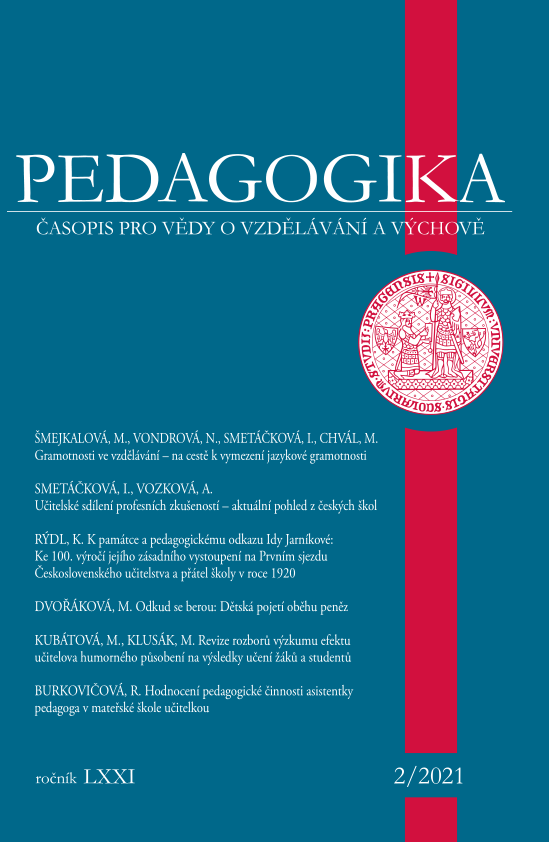Odkud se berou – dětská pojetí oběhu peněz
DOI:
https://doi.org/10.14712/23362189.2020.1850Klíčová slova:
dětská pojetí, konceptuální změna, hloubkové rozhovory, primární vzdělávání, oběh peněz, finanční gramotnostAbstrakt
Abstrakt: Studie uvádí do problematiky vývoje dětských pojetí ekonomických vztahů, konkrétně oběhu peněz v období primárního vzdělávání. Představuje teoretický rámec výzkumu dětských pojetí a předkládá dosavadní výzkumná zjištění.
Cílem bylo ve vztahu k teoretickému rámci získat a interpretovat vlastní výzkumná data k dětským pojetím oběhu peněz a porovnat výsledky s podobně zaměřenými zahraničními výzkumy z posledních 30 let.
Metoda – Data byla získána z polostrukturovaných rozhovorů zaměřených na dětská pojetí oběhu peněz. Transkripty rozhovorů byly kódovány a dětská pojetí následně kategorizována podle míry jejich komplexnosti a kompatibility dílčích myšlenek. Výsledky – V obou částech výzkumu dětská pojetí vykazují tendenci aplikovat na ekonomickou sféru vlastní sociální zkušenost. Oborově specifická pojetí odkazující k představě trhu práce nebo oběhu peněz ve společnosti byla vázána na zkušenost žáka s prací rodičů nebo na jiné konkrétní příklady více než na věk dotazovaných.
Závěry – Elicitovaná pojetí trhu práce a oběhu peněz mohou přispět oborové didaktice společenských věd jako východisko pro proces konceptuální změny. Výsledky nabízejí varianty neúplných, chybných konceptů nebo ukazují na jejich absenci a dávají podněty pro iniciaci konceptuální změny ve výuce.
Reference
Barrett, M., & Buchanan-Barrow, E. (2004). Children's understanding of society. Hove: Psychology Press.
https://doi.org/10.4324/9780203463567
Bastounis, M., Leiser, D., & Roland-Levy, C. (2004). Psychosocial variables involved in the construction of lay thinking about the economy: Results of a cross-national survey. Journal of Economic Psychology, 25, 263-278.
https://doi.org/10.1016/S0167-4870(02)00198-8
Berti, A. E. (2002). Children's understanding of society: Psychological studies and their educational implications. In E. Nasman & A. Ross (Eds.), Children's understanding in the new Europe (s. 89-107). Trentham Books.
Berti, A. E., Bombi, A. S., & Duveen, G. T. (1988). The child's construction of economics. Cambridge: Cambridge University Press.
Bonn, M., & Webley, P. (2000). South African children's understanding of money and banking. British Journal of Developmental Psychology, 18(2), 269-278.
https://doi.org/10.1348/026151000165689
Brophy, J., Alleman, J., & Halvorsen, A. (2018). Powerful social studies for elementary students. 4. vyd. Belmont, CA: Cengage.
Carey, S. (1988). Conceptual differences between children and adults. Mind & Langugage, 3(3), 167-181.
https://doi.org/10.1111/j.1468-0017.1988.tb00141.x
Clement, J. (2000). Analysis of clinical interviews: Foundations and model viability. In R. Lesh & A. Kelly (Eds.), Handbook of research methodologies for science and mathematics education (s. 341-385). Hillsdale: Lawrence Erlbaum.
Davies, P. (2019). The construction of frameworks in learners' thinking: Conceptual change and threshold concepts in economics. International Review of Economics Education, 30, 100-135.
https://doi.org/10.1016/j.iree.2018.05.002
di Sessa, A. A. (2013). A bird's-eye view of the "Pieces" vs "Coherence" controversy. In S. Vosniadou (Ed.), International handbook of research on conceptual change (s. 31-49). New York: Routledge.
Doulík, P. (2005). Geneze dětských pojetí vybraných fenoménů. Ústí nad Labem: Univerzita J. E. Purkyně.
Hesová, A. et al. (2014). Katalog materiálů pro rozvoj finanční gramotnosti. Praha: Národní ústav pro vzdělávání. Dostupné z http://clanky.rvp.cz
Hradil, D. (2012). Shrnutí hlavních výstupů z měření finanční gramotnosti obyvatel ČR pro MF a ČNB. Dostupné z www.mfcr.cz
Hutchings, M. (2002). Toward an antidevelopmental view of children's social and economic inderstanding. In E. Nasman & A. Ross (Eds.), Children's understanding in the new Europe (s. 32-60). Trentham Books.
Chi, M. T. H. (2008). Three types of conceptual change: Belief revision, mental model transformation, and categorical shift. In S. Vosniadou (Ed.), International handbook of research on conceptual change (s. 61-82). New York: Routledge.
Chi, M. T. H. (2013). Two kinds and four sub-types of misconceived knowledge, ways to change it, and learning outcomes. In S. Vosniadou (Ed.), International handbook of research on conceptual change (s. 49-71). New York: Routledge.
Jahoda, G. (1983). European "lag" in the development of an economic concept: A study in Zimbabwe. British Journal of Developmental Psychology, 1, 113-120.
https://doi.org/10.1111/j.2044-835X.1983.tb00549.x
Janík, T. et al. (2007). Pedagogical content knowledge nebo didaktická znalost obsahu? Brno: Paido.
Jelemenska, P., Sander, E., & Kattmann, U. (2003). Model didaktickej rekonštrukcie: Impulz pre výskum v oborových didaktikách. Pedagogika, 53(2), 190-201.
Klínský, P., & Chromá, D. (2009). Finanční gramotnost: úlohy a metodika. Praha: Národní ústav odborného vzdělávání.
Leiser, D., & Drori, S. (2005). Naive understanding of inflation. The Journal of Socio-Economics, 34, 179-198.
https://doi.org/10.1016/j.socec.2004.09.006
Leiser, D., & Halachmi, R. B. (2006). Children's understanding of market forces. Journal of Economic Psychology, 27(1), 6-19.
https://doi.org/10.1016/j.joep.2005.06.008
Leiser, D., Seven, G., & Daphna, L. (1990). Children's economic socialization: summarizing the cross-cultural comparison of ten countries. Journal of Economic Psychology, 11, 591-614.
https://doi.org/10.1016/0167-4870(90)90038-B
Marton, F., & Pang, M. F. (2008). The idea of phenomenography and the pedagogy of conceptual change. In S. Vosniadou (Ed.), International handbook of research on conceptual change (s. 533-559). New York: Routledge.
Özdemir, G., & Clark, D. B. (2007). An overview of conceptual change theories. Eurasia Journal of Mathematics, Science and Technology Education, 3(4), 351-361.
https://doi.org/10.12973/ejmste/75414
Parsons, R., & Mamo, M. (2017). The source and impact of student preconceptions in economics principles classes. International Review of Economics Education, 25, 15-24.
https://doi.org/10.1016/j.iree.2017.04.001
Siegler, R. S., & Thompson, D. R. (1998). Hey, would you like a nice cold cup of lemonade on this day? Children's understanding of economic causation. Developmental Psychology, 34(1), 146-160.
https://doi.org/10.1037/0012-1649.34.1.146
PMid:9471012
Škoda, J. (2005). Současné trendy v přírodovědném vzděláváni. Ústí nad Labem: Univerzita J. E. Purkyně.
Vosniadou, S. (Ed.). (2008). International handbook of research on conceptual change. New York: Routledge.
https://doi.org/10.4324/9780203874813
Vosniadou, S. (Ed.). (2013). International handbook of research on conceptual change. 2. vyd. New York: Routledge.
https://doi.org/10.4324/9780203154472
Vyskočilová, E., & Morgado, L. (2000). Rozumí české děti ekonomickým pojmům a vztahům podobně jako portugalské děti? Československá psychologie, 44(6), 528-537.
Webley, P. (2004). Children's understanding of economics. In M. Barrett & E. Buchanan-Barrow (Eds.), Children's understanding of society (s. 43-67). Hove: Psychology Press.



